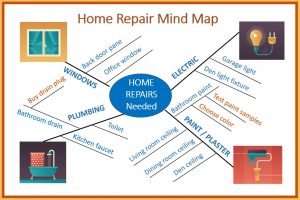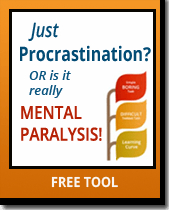ADHD Adult and Study
College, Grad School & Beyond
Success in Projects & Study
 CLASS DESCRIPTION
CLASS DESCRIPTION
Why would the typical, average “plodder” be more likely to succeed in school than a brilliant ADD / ADHD student?
It happens all too often. Students with high IQ's and test scores, who did well in high school, suddenly start to flounder and fail once they leave the structure of home. In college, the student who has not developed consistent study skills is no longer able to get by with erratic ADD habits caused by disorganization, avoidance, distraction and impulsivity.
Age and maturity do not make study and school projects easier
In fact, the opposite can be true! A lifetime of ADD habits simply solidifies the tendencies you have, so your attempts at study as a returning student may be just as difficult as when you were younger. Plus, older students may have the added responsibilities of work, family and bills.
If you got poor grades at age 18 because you couldn't resist hanging out with your friends instead of studying, you may similarly get distracted at 45 in grad school because your husband wants to go to the movies, your sister calls to chat, or you don't want to miss the big game.
Here are a few simple truths for most academic environments:
- Brilliance and creativity mean nothing if a student doesn't apply them to assignments.
- In higher education, students are expected to complete assignments according to directions, and on time.
- ADDers who haven't learned how to study, plan and organize their work will flounder, once they leave parental structure.
- ADD traits of procrastination, disorganization, impulsivity, overwhelm, distraction and avoidance can undermine a student's best intentions.
- ADDers will not succeed by following the study habits of others; they must learn how to do things their own best way.
- Most ADDers are not able to determine their own best study strategies without help.
The Good News: Studying Effectively is a Learnable Skill!
The key to academic success, as an ADDer, is to create customized strategies based on your own traits, tendencies and personality.
What's Covered in this Class
This class will present all the factors that make a critical difference for ADD Adults in school. You'll learn how to create an environment and develop strategies that will lead to success instead of failure. We'll discuss the typical tendencies that ADDers have, how to spot the red warning flags that indicate potential problems ahead, and what to do about them.
This is a 90-minute recording, with lecture as well as questions/answers and discussion. Thorough summary notes and a recording of the class allow you to relax, listen and participate as you wish.
- How to recognize the “killer assumptions” and bad decisions
that undermine you every day without you realizing it; - How to break down assignments into easy, small steps, and
determine how long they'll take you to do; - How to work with a visual calendar, planning your week, month
and semester at a glance; - How to create the perfect study environment and tools for
yourself, for different kinds of tasks; - How to develop essential, enjoyable rituals to stay on task;
- How to manage your teachers' expectations? and motivate the
teacher to want to help you; - How to gain points for class participation, even when you're
struggling to understand the material; - How to manage large projects and independent study,
creating a workable schedule and sticking to it.
This class is NOT about:
- Overcoming learning-related challenges such as learning disabilities, dyslexia, and cognitive disabilities;
- Getting accommodations for ADD;
- What schools are legally required to offer.
Who Should Take this Class:
FORMAL ADD / ADHD DIAGNOSIS IS NOT NECESSARY! This class was created to help ADDers, or those with ADD-like traits.The class will benefit you if you are a:
- College or Graduate student struggling to keep up with class
assignments, feeling overwhelmed or disorganized; - Adult ADD student who has failed or dropped out previously, and need to learn a different approach this time;
- ADD student facing a different structure in school than
you had before; particularly moving into a LESS structured situation; - Parent of an ADD high school or college student who wants to learn how to spot problems before they grow;
- Anyone working on an independent study or writing project
such as thesis or dissertation, term papers or large class projects; - Adult studying on your own for the Bar exam or career certification exams;
- Teacher at high school level and above who wants more insight into ADD students' particular difficulties.
Don't wait any longer to develop success habits for study. DOWNLOAD NOW!
This class is led by Bonnie Mincu, MA, MBA, ADD Coach.
Notes and Audio Recording Included
Links to download the teleclass recording and notes will be emailed to you immediately upon your registration / purchase.
| CLICK HERE to download notes and audio. | Listen at your convenience |
| Length – 90 minutes | Price – $37 |
In the Blog

Manage your ADHD to get your work done Having ADHD doesn’t mean that you can’t hold a job or do your job well. Most adults with ADHD can succeed in their careers because they know how to manage their condition at work. The following tips can help you get through the workday with minimal stress, Read post.

ADHD and Mind-Mapping: Best Technique for Planning
Capture your thoughts visually to plan your project With ADHD, you’re full of ideas. But your plans just continue to swirl around in your head without turning into action. If you don’t capture your thoughts in a way you can act upon, too many ideas can just become an overwhelming distraction that keep you stuck. Read post.

How to change your words and banish ADHD shame What you say defines you. Not just to others, but to yourself. When guilt, embarrassment, or ‘not enoughness’ of ADHD slip into your conversation, you transmit insecurity and shame. Worse, you reinforce that message to yourself. But if you pause just long enough to reconsider and Read post.
